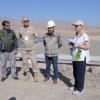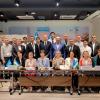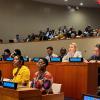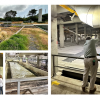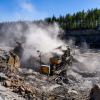News
Displaying Results 1 - 25 of 159
UNECE is supporting Turkmenistan to strengthen efforts on its sustainable energy transition and to deliver methane emissions reductions from the energy sector, in alignment with global climate objectives.
This was the focus of discussions this week between Mr. Dario Liguti, Director of the…
Best available techniques (BATs) have emerged as a key policy tool to prevent and control the emission of industrial pollutants, and thereby to ensure the protection of human health and the environment. Applying BATs to different sources is a key requirement for Parties to the latest three…
Sound emission inventories are the first step for designing effective clean air policies as they provide information about the main sources and the most acute air pollution problems in a country.
Under the Convention on Long-range Transboundary Air Pollution (Air Convention), UNECE has therefore…
Petite forests, or small, dense clusters of native trees, are designed for compact urban spaces like streets, plazas, and schoolyards. These micro-forests offer significant benefits for enhancing biodiversity, combating climate change, and fostering community engagement.
The UN Petite Forest…
On the heels of the Summit of the Future and adoption of the Pact for the Future, the first Hamburg Sustainability Conference (7-8 October) gathered international policy makers, business leaders and civil society to discuss ways to accelerate SDG implementation. Attending the conference, UNECE…
The building sector is the largest consumer of energy in the Republic of Moldova, representing 53 per cent of final energy consumption in 2022, with public sector buildings accounting for less than one-fifth and residential buildings for the rest. The crucial aspect that influences energy…
Addressing the Plenary of the Summit of the Future during the UN General Assembly, UNECE Executive Secretary Tatiana Molcean noted that with its strong normative footprint, UNECE is fully dedicated to leveraging and adapting its tools, expertise, and partnerships to reinvigorate the implementation…
With its mining industry set to expand, Uzbekistan is taking steps to strengthen the safety of Tailings Management Facilities (TMFs), thanks to practical training organized by UNECE. The 3-day training session this week brought together representatives from national authorities, mining operators,…
The Principles and Actionable Recommendations for Critical Energy Transition Minerals (CETM) developed by the UN Secretary-General’s Panel set a clear mandate for a global transformation in resource governance.
As Clovis Freire, Chief, Commodity Research and Analysis Section, at UNCTAD, emphasized…
Uzbekistan, the most populated Central Asian country with some 35 million people, faces water stress and inefficient water use. In addition, as a major producer of gold and uranium with its rapidly developing mining industry, the country is exposed to increasing environmental and health risks.…
While nitrogen is vital for plant growth, excessive and inefficient use of this nutrient means up to 80% of it leaks into the environment, mostly in various polluting forms of nitrogen: ammonia and nitrogen oxides, which are harmful air pollutants; nitrous oxide, a potent greenhouse gas; and…
After Morocco (2022) and Mauritania (2023), the UNECE Environmental Performance Reviews (EPR) continue to reach beyond the region of the United Nations Economic Commission for Europe (UNECE). Mongolia has requested UNECE to undertake its second review, following the first in 2017.
Today, a…
Following the decision of Parties to the UNECE Convention on Long-range Transboundary Air Pollution (Air Convention) to revise the Protocol to Abate Acidification, Eutrophication and Ground-Level Ozone (Gothenburg Protocol), which is expected to further strengthen efforts to reduce air pollution in…
South Sudan, the world’s newest nation and a landlocked country in Eastern Central Africa, is situated in the middle of the basin of the Nile River, Africa’s longest river. Sharing significant transboundary wetlands, experiencing annual catastrophic floods and droughts and facing immense…
Civil society plays a vital role in addressing major environmental challenges. To fully harness this potential, ongoing efforts are essential to uphold the public rights to promote effective and inclusive environmental governance and a clean, healthy and sustainable environment.
To tackle these…
Taking part in the High-Level Political Forum on Sustainable Development in New York (8 – 17 July), UNECE Executive Secretary Tatiana Molcean presented UNECE regional perspectives on SDGs localization, climate action, energy, transport, water and engaged with civil society, youth, and the private…
Mapping air pollutant emission sources in a country helps experts and decision-makers identify the most effective policies. Understanding the regional distribution of emissions is crucial for effective policy implementation.
Spatially allocating—or gridding—emissions is technically challenging.…
Representatives from countries across Central Asia and experts on the climate and clean air came together in Astana, Kazakhstan this week (11-13 June 2024) for the Sub-Regional Workshop on Integrated Planning for Climate and Air organized by the UNEP-convened Climate and Clean Air Coalition (CCAC)…
Mediterranean countries come together to increase climate resilience of water and sanitation sectors
The Mediterranean region is warming 20% faster than the global average and for every 1-degree global temperature increase, it would warm up by at least 1.5-2 degrees. This is severely impacting water and sanitation and the health and well-being of the region’s population. According to the World…
In an important move to secure the supply of essential raw materials, the European Critical Raw Materials Act (CRMA) entered into force on 23 May 2024. This legislation is a cornerstone in enhancing the EU's capabilities in sourcing, processing, and recycling critical raw materials (CRMs), which…
In North Macedonia, assisting households to make investments in green technologies not only supports climate action, but also helps them save on energy costs and improves living standards.
To support this aim, UNECE, UNDP, and IOM organized a Capacity Building Workshop in Skopje on the design of…
With its strong mining industry, mountainous areas and high seismic hazards, prevention and preparedness for disasters and climate change adaptation are high on Tajikistan’s agenda. In particular, the increasing frequency and severity of weather events due to climate change can undermine the safety…
The Fourth Cycle of UNECE Environmental Performance Reviews (EPR) is underway with the fourth review of Montenegro, carried out under the leadership of UNECE.
A large, multidisciplinary team of international experts worked in Podgorica from 22 to 30 April 2024, assessing the environmental…
As the climate warms, wildfires are becoming more frequent. Parts of Southern Europe, such as Spain and Greece, have already seen their first wildfires of the season, with devastating impacts on local ecosystems and biodiversity. Wildfires, however, also have major impacts on global and regional…
UNECE Resource Management Week 2024 spotlighted the growing roles of the United Nations Framework Classification for Resources (UNFC) and the United Nations Resource Management System (UNRMS) in promoting sustainable development through enhanced integration and effective management of natural…






